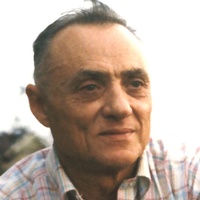- Date Of Birth: January 20, 1924
- Date Of Death: December 11, 2017
- State: Illinois
He was an intelligent, creative, and skilled craftsman. He was self–reliant and generous. He had a passion for learning and he was a devoted husband and father.
Wassil Schypko, 93, passed away peacefully at St Elizabeth Manor Monday evening, December 11, 2017 with his loving wife and daughter at his bedside. Son to Joseph and Melania Schypko, Wassil was born January 20, 1924 in Pincesmarija, County of Busow, Romania. He was raised along with four sisters and a brother in the Gengorka region in Ukraine. Consumed with wanderlust and seeking adventure, he left his home as a teenager, where he was swept up in the events of the Second World War. He ended up in Munich, Germany in 1941 where he met Prossa Kussmina. Having survived the war, they were married in 1946.
Wassil ended up working for the victorious Americans transporting prisoners and witnesses to the Nuremburg Trials. His first daughter, Ludmilla was born in Munich in 1950 and Wassil’s family subsequently immigrated to the United States. Their immigration journey eventually led them to the Chicago area, where his daughter, Helene was born and where Wassil learned and mastered the trade of carpentry. After years as a proud member of the United Brotherhood of Carpenters, Local 839 in the village of Fox River Grove, Illinois, Wassil retired in 1986. Wassil was a member of St. Vladimir Russian Orthodox Church near Rock City, Illinois. He and Prossa moved to Janesville in 2001 to be near Ludmilla’s family.
From Jason on his grandfather’s experience of the war in Europe…
“Grandpa told me that when Germany invaded the Crimea, he was a teenager and was driving transports for Russia. Because of all the deaths he was seeing, he decided to quit and go home. Grandpa was stopped by a Soviet patrol, interrogated for six hours and let go when he convinced them he was just going to the next town. They dropped him off after pressuring him to join the army. Grandpa was taken in by an old lady and stole things to repay her. Later, he continued his journey home by stealing a horse, and after a long time reached some friends of his fathers. Still 80 kilometers from home, he had to dodge mines left by the Russians. Ten kilometers from home he was 15 feet ahead of a horse and cart when they hit a mine.
When he turned, he saw the driver high in the sky. Grandpa told me that when he did get home, the Germans were offering the locals a chance to move to Germany to work or they could stay and become a part of Stalin’s communism. Grandpa decided to go to Germany where he worked driving trucks in Munich. That is where he met Grandma who was working in a restaurant. After the war, Grandpa had to hide out to avoid being sent back to Stalin by the Americans. He was caught and rounded up with many other Russians to be sent back to Stalin, but he escaped. Grandpa learned later that when Stalin got all those other Russians back, he killed them all. When Grandpa felt he was no longer going to be turned in by the Americans, he came out of hiding and started working for the Americans. He drove trucks which included transporting prisoners and witnesses to the Nuremburg Trials.”
Survivors of Wassil include his wife, Prossa, daughters Ludmilla Beckenbaugh (Michael) and Helen Lorenz; and grandchildren, Jason Beckenbaugh (Megan), Brennan Beckenbaugh, and Donny Lorenz.
Wassil’s family is grateful to all the workers at Dean St. Mary’s and Rock Haven for the care they provided Wassil. His final days were especially comforting, rendered by the dedicated, compassionate staff of St. Elizabeth Manor and Heartland Hospice.
